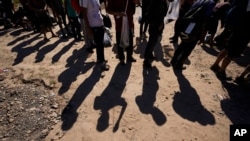The U.S. Citizenship and Immigration Services is increasing certain immigration and naturalization fees for the first time since 2016. The change will be in effect April 1.
The increases affect employment-based petitions, family-based immigration applications, and U.S. naturalization cases. Per U.S. immigration law, USCIS is required to revise its fee structure every two years.
"After leaving these fees unchanged for the three years following passage of the [USCIS Stabilization] Act, [the U.S. Department of Homeland Security, or DHS] is now increasing the premium processing fees USCIS charges for all eligible forms and categories to reflect the amount of inflation from June 2021 through June 2023," according to a USCIS statement.
Nearly 96% of operations conducted by USCIS, and agency of DHS, rely primarily on user fees.
The key changes are for the H-1B visa, a category that allows 85,000 highly skilled foreigners to come to the U.S. to work for at least three years. Its registration fee will increase from $10 to $215 per registration and is to take effect in March 2025 for the fiscal 2026 season and subsequent years. The employers pay these fees.
According to the immigration agency, the goal is to align fees with the operational costs associated with managing the H-1B registration system. But for the ongoing fiscal 2025 cap season, the registration fee remains at $10.
Fees for U.S. naturalization applications, currently $640, will increase to $710 if the filing is done online. If the applicant chooses to send its application by mail, the cost is $760.
U.S. citizens and green card holders can apply to sponsor certain family members through the I-130 form. This petition will now cost $675 for paper filing, and $625 for online filing.
Those U.S. citizens hoping to bring a fiance to the United States will pay $675 instead of $535 for that K-1 visa.
Applicants filing form I-485 used to adjust status to permanent residency also known as a green card, will pay from $1,225 to $1,440. Employment authorization and advance parole, which were free applications under the adjustment of status process, will now cost an additional $260 and $630, respectively.
USCIS is also introducing a new asylum program fee of $600 to process petitions for temporary and permanent workers for certain employers. The employers pay the fees.
The fee will support asylum-related operations, including those connected to the Biden administration's asylum processing rule. Under this rule, USCIS officers, rather than immigration judges, will handle asylum merits interviews for specific recent arrivals.
The American Immigration Council and the American Immigration Lawyers Association filed comments during the rule-making process in March 2023, expressing concern about the impact on small-business owners.
"In the final rule, USCIS decided to charge lower filing and asylum program fees to small employers (maximum of 25 full-time employees) and lower filing and no asylum program fee to nonprofits," according to the American Immigration Council.
In fiscal 2023, USCIS received 10.9 million filings. The agency also said they completed more than 10 million pending cases, which reduced overall backlogs by 15%. USCIS also administered the Oath of Allegiance to more than 878,500 new U.S. citizens.
"We've completed a record number of cases, responded to emerging crises around the globe with essential humanitarian relief, and applied innovative solutions to improve customer experience and reduce backlogs," USCIS Director Ur M. Jaddou wrote in a statement.




